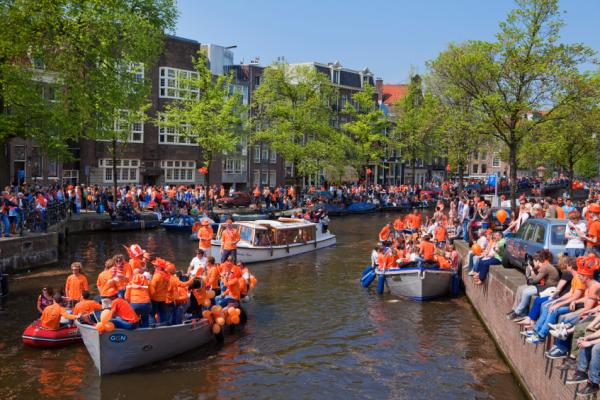Koninginnedag (Queen’s Day), Netherlands
Koningsdag or the King’s Day is the national holiday in the Kingdom of Netherlands. Celebrated on the 29 April, the date marks the birth of King Willem-Alexander. It is assumed to mark to be an occasion of national harmony and integrity.
The trend began on the August 31, 1885 on the birthday of Princess Wilhelmina, who subsequently became the Queen Wilhelmina. Following the taking over the Queen Juliana in the 1949, the day is celebrated on the April 30 or the birthday of Queen Juliana. Despite the fact that the birthday of Queen Beatrix is on the January 31, but she formally observes her birthday on the April 30.
The contemporary observation of this occasion was initially planned by the Liberal Union, the Dutch Liberal Political Party, to be the day of countrywide harmony in the Netherlands.
From the 1885 to 1890, the event was known as the Princess’ Day or the Prinsessedag, before the enthronement of the Wilhelmina in the 1890. Since the 31 August 1891, the celebration was called the Koninginnedag or Queen’s Day.
The day was not only the Queen’s Birthday, but also the last day of the summer vacation, which made the festivities admirable with kids.
Traditionally, the celebrations involved the parade (for Wilhelmina), the floral tribute (for Juliana), and the tour of the town of Netherlands by the Beatrix who uses the opportunity to honour her country’s citizens and thank them for their service.
The Koningsdag is famous for its nationwide “free market” at which many Dutch people sell their second hand items. It is also an opportunity for “Orange madness” for the national colour, when the normally strait-laced let down their hair, often dyed orange for the occasion.
The biggest celebrations take place in Amsterdam, with the festivities starting the day early on the “Queens Night” and taking over the stress, canals, parks and building. The biggest festivity of the Queen’s Day takes place in Amsterdam, Queen’s Dance or in Dutch Koninginnedans in the Rotterdam and Queens’s Night in The Hague.
The other activities on this day include the Children’s games, musical performances and the musical shows. During the festivities, people put on the orange coloured dress to address the colour of Orange-Nassau. On the certain occasion, this activity is known as the “orange craze”.
The trend began on the August 31, 1885 on the birthday of Princess Wilhelmina, who subsequently became the Queen Wilhelmina. Following the taking over the Queen Juliana in the 1949, the day is celebrated on the April 30 or the birthday of Queen Juliana. Despite the fact that the birthday of Queen Beatrix is on the January 31, but she formally observes her birthday on the April 30.
The contemporary observation of this occasion was initially planned by the Liberal Union, the Dutch Liberal Political Party, to be the day of countrywide harmony in the Netherlands.
From the 1885 to 1890, the event was known as the Princess’ Day or the Prinsessedag, before the enthronement of the Wilhelmina in the 1890. Since the 31 August 1891, the celebration was called the Koninginnedag or Queen’s Day.
The day was not only the Queen’s Birthday, but also the last day of the summer vacation, which made the festivities admirable with kids.
Traditionally, the celebrations involved the parade (for Wilhelmina), the floral tribute (for Juliana), and the tour of the town of Netherlands by the Beatrix who uses the opportunity to honour her country’s citizens and thank them for their service.
The Koningsdag is famous for its nationwide “free market” at which many Dutch people sell their second hand items. It is also an opportunity for “Orange madness” for the national colour, when the normally strait-laced let down their hair, often dyed orange for the occasion.
The biggest celebrations take place in Amsterdam, with the festivities starting the day early on the “Queens Night” and taking over the stress, canals, parks and building. The biggest festivity of the Queen’s Day takes place in Amsterdam, Queen’s Dance or in Dutch Koninginnedans in the Rotterdam and Queens’s Night in The Hague.
The other activities on this day include the Children’s games, musical performances and the musical shows. During the festivities, people put on the orange coloured dress to address the colour of Orange-Nassau. On the certain occasion, this activity is known as the “orange craze”.
.png)





0 comments: